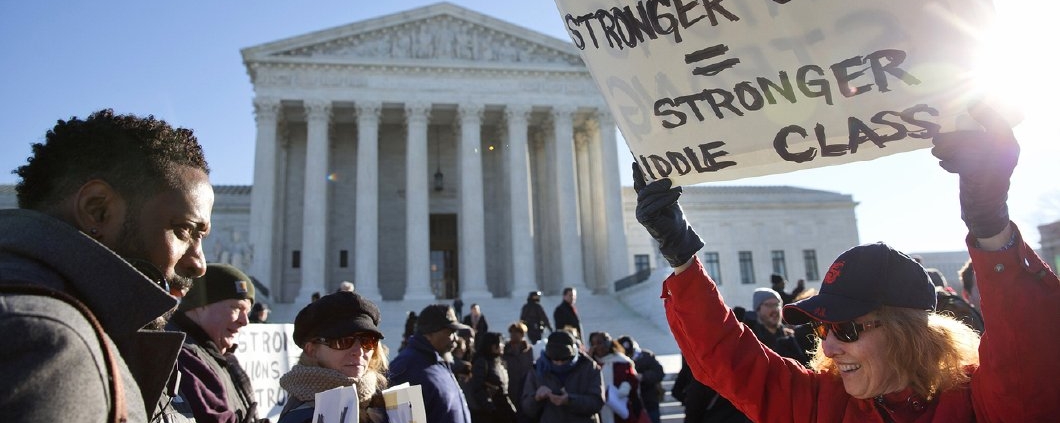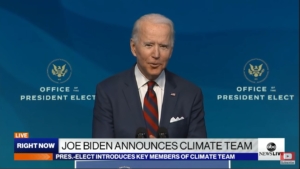Unions on the Edge, Stoking Simplicity on Guns, and Knowing What Trudeau’nt Know
Here’s What You Need To Know
Beneath the din of Russia-gate and gun control, this week, the Supreme Court heard arguments in a case that could profoundly change the level of political participation by public employee unions. In Janus v. American Federation of State, County and Municipal Employees, Council 31, should the Court rule in favor of lead plaintiff Mark Janus, who is a child-support specialist at the Illinois Department of Healthcare and Family Services, public-sector unions will be dealt a sharp blow to their ability to compel members, and even non-members, to fund these unions’ political activity. Here is some background on the case and more details on its possible implications:
- Where The Law Stands Now: The law in 22 states allows public-sector unions to charge public employees that are not union members “agency” or “fair share” fees. The idea behind this is that non-members benefit from the collective bargaining of that union, thereby preventing workers who benefit from union representation from being so-called “free-riders.” However, with public-sector unions participating in the political process – largely to the benefit of the Democratic Party – non-members may be supporting political activities they personally oppose.
- The Legal Precedent For Agency Fees: This current arrangement is based off of a Supreme Court case known as Abood v. Detroit Board of Education, which in 1977 unanimously upheld these mandatory public-sector union fees. The case has been challenged in the Court three times in the last four years, with the most recent challenge coming shortly after the passing of Justice Antonin Scalia, resulting in a 4-4 deadlock on that case.
- The Janus Case: Mark Janus is an Illinois state employee who is not a member of a public union, and he contends the state law that allows unions to require him to pay agency fees violates his first amendment rights. Particularly, his case argues that the agency fees compel him to speak for and associate with the union, regardless of his personal political beliefs. Janus wants the Supreme Court to overturn the precedent set in Abood.
- What This Would Mean For Unions: Should the Court rule in favor of Janus, public-sector unions could stand to lose millions of members, not to mention the fees that 35 percent of them would not pay if they were not compelled to do so. At a time when Americans are already “voting with their feet” by moving to right-to-work states with more economic opportunity to the detriment of those with “forced unionism,” any silver lining about opportunities for public-sector unions to adapt by proving membership value and implementing private-sector union tactics does not change the fact that the movement will be severely hindered.
Now that Justice Gorsuch was appointed to fill the seat once held by late-Justice Scalia, conventional wisdom holds that the court is likely to rule in favor of Janus, which has led to some preliminary posturing by Democratic politicians who suggest that the Court must rule against him in order to maintain its “status and integrity.” The newest-appointee to the bench did not tip his hand during this week’s debate, and again the Court appears split, but if the high-stakes cases against Obamacare taught us anything, it’s that we need to wait until this summer to know how this consequential case will play out.
News You Can Use
KNOWING WHAT TRUDEAU’NT KNOW
Subscribe to Receive Insights
"*" indicates required fields
At Delve, we believe that knowing what you don’t know is the key to successful outcomes, which is advice that Canadian Prime Minister Justin Trudeau should have heeded before his “disastrous” trip to India this month. Besides ridiculing the cultural appropriation of donning a variety of traditional Indian costumes and dancing a Bhangra, the Canadian media speculated that Trudeau was “snubbed” by the Indian government, who sent a junior minister to meet him at the airport upon his arrival (sari, not sari).
As if that were not enough, Trudeau had to declare his support for “one united India” in Mumbai last week after his wife posed with a convicted Sikh separatist. If some wonder whether self-awareness is part of the Trudeau brand, it seems that “peoplekind” have enough evidence to be well aware that the Canadian Prime Minister is #justnotready for primetime.
STOKING SIMPLICITY ON THE GUN DEBATE
After CNN’s town hall event on guns in the wake of the school shooting in Parkland, Florida, Chicago Tribune columnist John Kass suggests that the format, whose “raw emotion” made for “compelling TV,” did a disservice to the debate over guns because “TV can’t handle …context, or complicated, layered arguments.” Kass points in particular to the way the nation’s founders designed the policy process to work – to prevent quick changes, restrain and diffuse the passions of the moment, protect individual liberty – as a check against politicians and demagogues who may be inclined to move quickly to make changes to the Bill of Rights.
As the debate continues, and regardless of where one stands, this is a complicated, substantial policy issue that is more nuanced than TV coverage that sells and is driven by passion, drama, and tears. Emotion-filled news coverage can bias and mask the facts, as evidenced by a recent Northeastern University study that found school shootings are actually less common today than they were in the 1990s. Kass writes that if “you weren’t moved by the parents and the students and their fear and anger, then you don’t have a heart.” But, he cautions, “the heart doesn’t make policy. And speaking from the heart alone isn’t the wisest thing to do when moving quickly to ‘do something’ to the Bill of Rights.”
CAN THE DANISH MODEL BE EXPORTED?
Denmark is ranked as the happiest country on earth and has achieved among the world’s highest levels of social cohesion. Bloomberg’s Megan McArdle set out on a recent reporting trip to the Scandinavian country to examine what has made it successful and the envy of other civilized countries. What she ultimately discovered was that Denmark’s political system was unique given the country’s small population, its relative homogeneity, as well as its high taxes, wages, employment, and efficiency.
Above all, she found that Danes’ high levels of trust – in each other and in their institutions – were conducive to a policy environment that was inherently Danish and difficult to replicate in other countries. Given that liberal politicians like Bernie Sanders have yearned to make America Dane again, perhaps McArdle’s reporting can help lead policymakers away from such an unproductive talking point toward workable policy proposals that can gain the support of voters.
HOW IMPACTFUL ARE IMPACT BONDS?
Social impact bonds, which are pay-for-success contracts used by governments to deliver initiatives with the help of the private sector, have become an increasingly popular option for governments looking to deliver on specific policy outcomes. These bonds entail governments contracting with outside funders like banks to raise capital for service providers to deliver a certain outcome, such as Connecticut’s bond to aid the children of opioid-addicted parents and Massachusetts’ bond to help immigrants assimilate to the workforce. When service providers meet the targets laid out in the contract, funders get paid a return on their initial investment.
Despite concerns about the potential for “undue interference” from private investors with their own agendas, social impact bonds may provide a solution for more and more governments to experiment with “risk-free innovation” that leverage private money, are governed and funded by observable metrics, and shun misguided policies driven simply by hope and ideology. Yet, with only ten of the 27 bonds having come to term and delivering on their targets, it remains to be seen how viable this method is for both governments and investors until more data is collected.
PUTIN’S FAILED SYRIAN POWER PLAY
Details are emerging about a significant engagement between Russian fighters and U.S. forces in Syria early last month, which resulted in U.S. forces successfully repelling an attack and killing or wounding perhaps 300 Russian attackers – more Russians killed or wounded at the hands of the American military “than in any single encounter throughout the entirety of the Cold War.” The Kremlin has denied that Russian service members or military equipment was involved, and indeed that may be the case, as evidence shows that the attack may have been orchestrated by Russian oligarch Yevgeny Prigozhin’s Wagner Group of mercenaries.
Still, Prigozhin has close ties to and is understood to act with the blessing of Russian President Vladimir Putin, and he and another of his enterprises – the Internet Research Agency – were recently indicted by a federal grand jury for meddling in the 2016 presidential election. Putin may have supported this attack on U.S. forces in Syria to probe for weakness and look for an opportunity to undermine U.S. interests in the region, suggesting that these kinetic occurrences may become more frequent as a post-ISIS Syria takes shape and Putin attempts to revenge this humiliating defeat.



